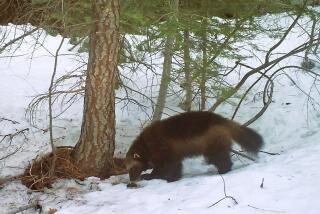Nature Treaty Signing Begins Without U.S.
A parade of nations began signing a biological diversity treaty Friday without the United States joining in, further diminishing its already battered stature at a global environmental summit here.
A spokeswoman for the United Nations Environment Program said at least 40 nations, including Germany, France and Canada, have pledged to sign the pact, aimed at conserving plants, animals and microorganisms and their habitat. Ratification by 30 nations is required for the treaty to take effect.
William K. Reilly, the beleaguered chief of the U.S. delegation at the summit, confirmed that he had failed in his efforts to negotiate changes that would enable the United States to sign the accord. He also condemned the decision by someone within the Bush Administration to make public a confidential memorandum from him after the White House rebuffed his efforts. The memo to the White House outlined the suggested treaty changes.
The memo was leaked Thursday to the New York Times by a critic of the treaty in what was possibly an attempt to embarrass Reilly and undermine any chance that the United States would reconsider the accord.
“It is most unfortunate that someone within our government chose to leak information about these most important efforts--efforts that demanded diplomatic discretion,” Reilly, chief of the U.S. Environmental Protection Agency, said in a prepared statement.
Asked about the furor over the memo on Friday, Bush called Reilly a “top environmentalist (who) has my full support.”
“He conducts himself the way he should, with great dignity and great decency,” Bush told reporters.
The President, who occasionally socializes with Reilly and his wife, described the leaking of the memo as “terribly offensive.” He said he had tried to reach Reilly by telephone to express his support.
In his cable, sent Wednesday to Clayton K. Yeutter, Bush’s chief domestic policy adviser, Reilly asked for White House “clearance” on new treaty language that Brazil was prepared to negotiate on Washington’s behalf.
“The U.S. refusal to sign the biodiversity treaty is the major subject of press and delegate concern here . . .” said the memo, distributed to reporters attending the summit on Friday. “The changes proposed, while not making everyone in the U.S. government totally happy, would address the critical issues that have been identified. They are worth a last examination.”
Just hours before he sent the cable, Reilly had told an international press gathering that the United States was not encouraging any efforts to reopen the treaty.
The Bush Administration has refused to sign the accord because of objections to provisions on patent protection, potential restrictions on the biotechnology industry and financing.
A top U.N. official has warned that American resistance may prompt developing nations to deny American industry access to their plants and other genetic resources that could be useful for medicine and agriculture.
Reilly also has expressed concern that poorer nations, particularly those with large tropical forests, could use the treaty to keep American researchers out.
Scientists have hoped the treaty might stem the rapid loss of tropical forests, where most species live. Many researchers believe that half of all plants, animals and other organisms will be doomed to extinction by the middle of the next century if the destruction of forests continues at current rates.
The treaty is designed to give developing nations a financial incentive for conserving their tropical forests, which are rapidly being cleared for timber, fuel and agriculture.
Developing countries that sign must “endeavor” to provide access to their forests for environmentally sound uses, such as research for new drugs.
In return, industrialized nations are obligated to give financial aid and to share technology under “fair and most favorable terms.” The accord also recognizes the need for “effective protection” of patents and trade secrets.
A patent expert in the Administration conceded in a recent interview that the language could be interpreted as giving adequate protection to patents. But he complained that at least one developing nation, India, had interpreted the language as giving countries the right to expropriate U.S. technology--such as a formula for making a drug--if the product were derived from their plants or other materials.
Although some countries already steal American technology in violation of patents, the treaty would lend legitimacy to such piracy, Reilly has said.
The American biotechnology industry has urged the Administration not to sign, arguing that the accord could spark more regulation as well as dilute protection of property rights.
Reilly has said the treaty would not be effective without U.S. participation, and environmental activists have expressed similar concerns.
But Mostafa Kamal Tolba, executive director of the U.N. Environment Program, said the United States’ non-participation would not “destroy” the pact, even though the U.S. is a major contributor of aid to the Third World.
“It’s not a matter of life and death” for the treaty if some countries do not sign, Tolba said.
He called the treaty a “compromise” that balances the desire of developed countries in the Northern Hemisphere to prospect for natural substances of potential commercial value with the need of poorer nations in the Southern Hemisphere to earn money and share technology.
“The North needs the South in this agreement just as much as the South needs the North . . .” Tolba said at a signing ceremony. “It’s a two-way street.”
Japan is expected to sign but has not yet publicly pledged to do so. The United Kingdom, which has expressed concerns similar to those of the United States, has not yet announced whether it will support the agreement.
Nations have a year to sign the pact, and Tolba has predicted the U.S. eventually will do so. But environmental representatives monitoring the negotiations here expressed doubts that the Administration would ever back down.
“It’s legally possible, but I don’t think it’s politically likely,” said Richard Mott, a treaty officer for the World Wildlife Fund.
Activists applauded Reilly’s efforts to find a way to bring the U.S. into the fold and accused White House officials of attempting to undermine his effectiveness.
Delegates from other nations also expressed sympathy for Reilly as apparently unfounded rumors that he might resign circulated through their ranks.
“We would be concerned if that would happen because he has a good reputation in Australia,” said one Australian delegate.
Reilly has said in interviews that he has never considered resigning, even after losing several battles over environmental protection to White House conservatives.
But a noticeably irritated White House official contradicted Reilly on Friday. “Reilly does this a lot,” the official said. “He threatens to quit and all that stuff.”
Sen. Albert Gore Jr. (D-Tenn.), head of the Senate delegation at the summit, said Administration officials apparently leaked the memo “to torpedo” any opportunity for the U.S. to sign the biological diversity treaty.
“I believe President Bush has been poorly served by hard-liners in his Administration. . . .” Gore said.
The nature accord is one of two major treaties negotiated for the summit. The Bush Administration also was roundly criticized on the first--a climate change treaty--for refusing to include timetables and targets for reducing emissions of gases that contribute to global warming. The Administration will sign the less restrictive global warming treaty.
Despite the setbacks, Reilly appeared at a meeting of U.S. environmentalists early Friday, smiling and seemingly relaxed, passing by a group of youths carrying signs, “Support Reilly, not Bush.”
Administration sources said public reports about the memo also may have killed a possible move by the United States to demand renewed debate on the Rio Declaration, a non-binding statement embracing such tenets as a polluter’s obligation to pay for damage and a victim’s right to compensation.
Several passages in the document caused Washington to consider demanding the declaration be reopened, even though European allies were urging that the tediously negotiated text remain intact. But the U.S. delegation, preoccupied by the furor over the leak, appeared unwilling Friday to evoke more controversy on yet another accord. Among the language of concern to the United States is a provision that Reilly has said could be interpreted to excuse blatant abuses of human rights.
Gore, meanwhile, along with singer John Denver and the Dalai Lama, on Friday opened an alternative meeting of political and spiritual leaders aimed at bridging the gap between the official summit and the people of the world.
For three days, business leaders, artists, scientists, politicians and religious authorities will debate how to prevent global environmental disaster. The unorthodox parliament will also be addressed by children, while every session will begin with a song.
The Dalai Lama began his day with a visit to a Rio samba school, where he was met by dancing slum children. Amazon Indians crowned him with a traditional headdress.
He warned that awareness of environmental damage had been slow. “One day we may find all living things on this planet, including human beings, are doomed. . . . Damage to the environment is gradual, and once it is obvious to everyone, it’s too late,” he told the news conference.
Times staff writers William Long in Rio and Jim Gerstenzang in Washington contributed to this story.
BACKGROUND / Biodiversity
Scientists believe that biodiversity--the habitats, species and genes that together make life on Earth possible--is collapsing at mind-boggling rates. No one knows how many life forms human beings share the planet with: roughly 1.4 million species have been identified, but scientists believe the total number is between 10 million and 80 million. Most of these are tiny animals in little known environments such as tropical forests. But even a handful of soil from the Eastern United States is likely to contain many species unknown to science. Why should disappearing bugs and plants concern us? A species is the unique and irreplaceable product of millions of years of evolution. And like other species, human beings are dependent on others for their well-being.
More to Read
Start your day right
Sign up for Essential California for news, features and recommendations from the L.A. Times and beyond in your inbox six days a week.
You may occasionally receive promotional content from the Los Angeles Times.







